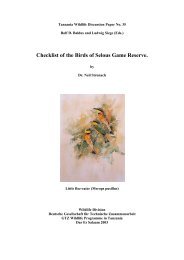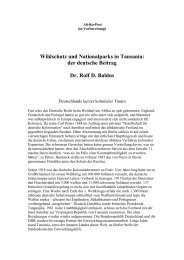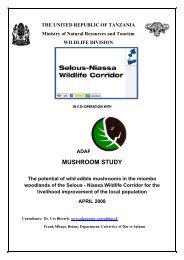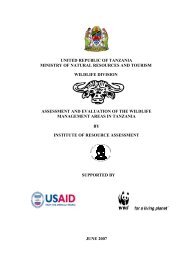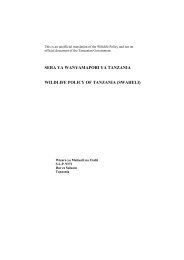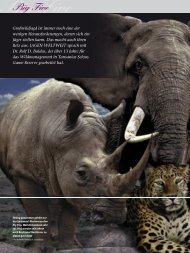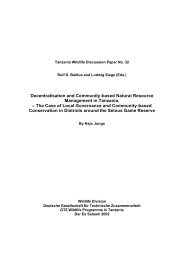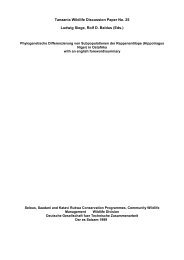African Indaba Articles - wildlife-baldus.com
African Indaba Articles - wildlife-baldus.com
African Indaba Articles - wildlife-baldus.com
You also want an ePaper? Increase the reach of your titles
YUMPU automatically turns print PDFs into web optimized ePapers that Google loves.
Southern <strong>African</strong> countries that engage in the practice have highly developed markets for live gamespecies and <strong>wildlife</strong> products. Besides, it has a <strong>com</strong>parative advantage over other developing countries,Kenya included, in terms of diversity of <strong>wildlife</strong> species and large <strong>wildlife</strong> populations.Common forms of <strong>wildlife</strong> consumptive utilization such as culling or cropping, live game sales, safarihunting and subsistence hunting for meat are a more sustainable means toward the same end. Forexample, in South Africa a single antelope such as a Kudu or Oryx to a trophy hunter is worth four cows.This has seen landowners convert their land from cattle rearing to <strong>wildlife</strong> keeping. After all, we have beenconsuming and trading in domestic animals since time immemorial and their population has neverdiminished.This calls for a paradigm shift and an ac<strong>com</strong>modative policy where a “conservation unit approach isadopted as opposed to conservation island approach”.Data for Pre-1977 ban shows land holders husbanded and encouraged <strong>wildlife</strong> hence their survival insignificant numbers. Experience has shown that where <strong>com</strong>munities participate fully in all conservationaspects, success is achievable and sustainable. This means top-down and centralized management byexecutive order is ineffective and the perception of conservation as a narrow sectoral technical issue, asubset of the environment management has failed.What is required is a <strong>com</strong>prehensive integrated approach that appreciates the critical role of theinhabitants.Policies on Wildlife Still Drawn From Colonial EraBy Joseph MagiriAre economic growth and environmental conservation mutually exclusive? Animal rights’ activists saythey are. Free market environmentalists say they are not. In groundbreaking research, Prof Terry LAnderson, an environment economist at Stanford University in the US, shows that market approaches toconservation can be economically sound and environmentally sensitive.In the book, You Have to Admit It’s Getting Better — From Economic Prosperity to EnvironmentalQuality, Anderson argues that economic growth and environmental quality are getting better — at least innorthern America and southern Africa.Anderson’s research helped launch free market environmentalism and prompted public debate overthe role of government in managing resources in US. Government subsidies often degrade the environment,but private property rights encourage resource stewardship and market incentives harness individualinitiative for protecting environmental quality, Anderson argues. Data supports his argument.In Kenyan parlance, Anderson says local <strong>com</strong>munities and not Government should manage <strong>wildlife</strong>.Currently, local <strong>com</strong>munities shoulder the costs of living with <strong>wildlife</strong>, but parties from outside reap thebenefits. Although tourism is a top foreign exchange earner, <strong>com</strong>munities living with <strong>wildlife</strong> are in abjectpoverty. And infrastructure such as the road to the Maasai Mara Game Reserve deteriorates to deplorablelevels because those who use the road are not responsible for fixing it. Anderson’s broad-ranging ideas haveprovided a refreshing and stimulating look at <strong>com</strong>plex and seemingly intractable environmental problems.A <strong>wildlife</strong> report prepared under the auspices of USAid is informed by free market environmentalismand not sport hunting, as critics seem to be saying. Free market environmentalism holds that costs andbenefit should be the central issue in <strong>wildlife</strong> conservation [editor’s emphasis].Godfrey Ntapayia of Kitengela Land Owners Association, a group that has trailblazed leasing land tocreate <strong>wildlife</strong> corridors, says a new policy addressing <strong>com</strong>pensation, ownership and who-plays-what-role inconservation is needed. Ntapayia adds that Sessional Paper No 3 of 1975 did not address resource sharing.Wildlife conservation policy is informed by outdated and draconian colonial thinking. The net effect is that<strong>wildlife</strong> populations have continued to decline despite huge funds spent in equipment and personnel to barlocals from using <strong>wildlife</strong>.Ian Parker, a former Kenya game warden and founder managing director Wildlife Services Ltd, EastAfrica’s first research private outfit, says: "Commerce and consumption of wild animals lumped under151



